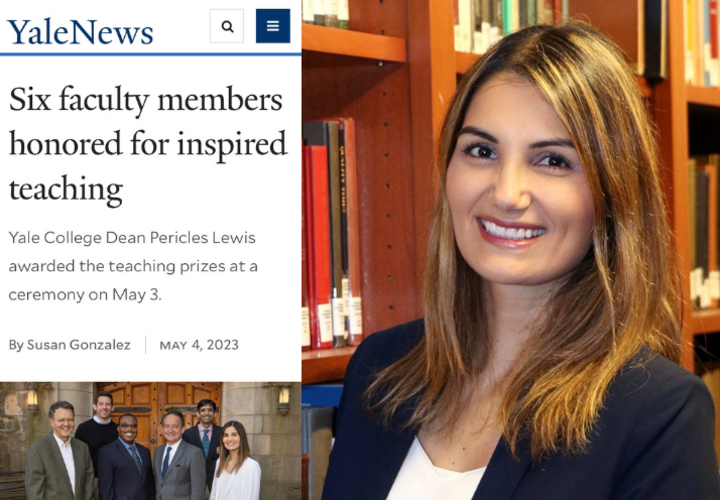Evangelia Chalioti Receives the Brodhead Prize for Teaching Excellence

In May 2023, Yale College Dean Pericles Lewis awarded Evangelia (Eva) Chalioti the Richard H. Brodhead Prize for teaching excellence for her “meticulous approach to teaching difficult economics courses with remarkable clarity.” Eva, a senior lecturer and associate chair in the Department of Economics, teaches some of the Department’s newest courses, including ‘Economics of Artificial Intelligence and Innovation,’ as well as larger core lecture courses such as ‘Intermediate Microeconomics,’ foundational to the hundreds of students completing the economics major.
In the prize citation, students called Eva’s teaching ‘flawless,’ ‘organized,’ ‘engaging,’ ‘incredible,’ and ‘wise.’ One student noted Eva’s ability to “break down the most complex economic theory into digestible steps. She engages students with relatable empirical examples, and more than anything it is clear that she cares about her students and wants them to succeed.”
Several students celebrated Eva’s ability to weave practical, empirical research examples into courses, making the material more meaningful and interesting. One student said, “When discussing the economics of innovation, she provided examples from competition between Windows and Apple, and when discussing the theory of networks she brought in discussions of Facebook and Snapchat. She knows what kind of empirical examples students can relate to, and she draws them in to bring to life complex theoretical models.” Another student mentioned that her unique, relevant, and practical assignments help prepare students for what is expected in the world outside of academics.
Eva has been a member of the Department of Economics since 2017, and currently teaches three courses for the Department and one for the MBA for Executives in the Yale School of Management. Below, she speaks about the award, her approach to teaching, and her background and research interests.
What does this teaching prize mean to you?
I am deeply honored to be the recipient of this prize. This wonderful recognition affirms my dedication to teaching economics but also my commitment to empowering students to achieve their fullest potential. I am grateful to Professor Tony Smith and Professor Dirk Bergemann whose support and guidance have shaped my academic journey at Yale. As Chairs of the Department of Economics during my years at Yale, they have provided me with numerous opportunities to grow as an educator, a researcher, and an administrator.
What courses are you currently teaching, and how does your approach vary from course to course?
‘Intermediate Microeconomics’ is a required course for students pursuing a major in Economics, and teaching this course has been a challenging yet rewarding experience. Teaching a core course has motivated me to develop new pedagogical methods to spark students’ curiosity for fundamental economic theories and guide them mastering the mathematical tools that underpin economic analysis.
I also teach two advanced undergraduate courses. Both courses embody the forward-thinking vision of the Department of Economics, aiming to equip students with the knowledge and skills necessary to succeed in the new digital markets. In the course on "Economic Models of New Technology," students examine how new technologies shape markets, consumer behavior, and industry dynamics. By studying topics such as innovation diffusion and market competition, students gain insights into the economic forces driving technological advancements and their implications.
In the course on “Economics of Artificial Intelligence and Innovation,” students delve into the strategies employed by modern corporations to leverage cutting-edge technologies to market and sell their products and services. They explore essential business strategies that enable companies to harness the potential of artificial intelligence. Students study several economic concepts such as price discrimination, dynamic pricing, bundling, searching costs, network effects, switching costs, advertising, and patents. In 2021, I was invited by the Committee on Economic Education of the American Economic Association to join the panel about “Teaching Innovative Courses in Economics” and talk about my vision and methods of teaching these courses and how they benefit the students.
At the Yale School of Management, I teach the course “Competitor” at the MBA program for Executives. This course also focuses on examining business strategies that empower organizations to unlock their potential in both brick-and-mortar stores and the new Internet marketplaces.
What is your background and research focus?
I completed my PhD in the Athens University of Economics and Business. Prior to Yale, I spent 3 years at the University of Illinois at Urbana-Champaign where I taught courses and conducted research on the field of the economics of innovation. My research revolves around competition, markets and innovation. It focuses on analyzing the effects of risk and the diffusion of scientific knowledge on firms’ incentives to innovate and compete. I also examine the conditions under which workers help or sabotage their colleagues in their attempt to build up their own reputation.